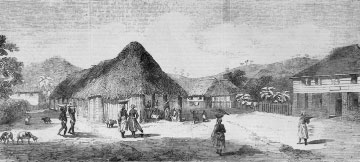John Kizell circa 1760 — circa 1830s

Though rare, some African survivors of the transatlantic slave trade were able to return to their homelands—either by intent or an unexpected series of events. John Kizell’s return to the Gallinas region of Sierra Leone was through the latter. Kizell returned as a father and veteran of the American Revolution. In Africa and Europe, he became a merchant, farmer, peacemaker, anti-slave trade abolitionist, Baptist preacher, and key voice in the founding of Liberia, a colony for free blacks in the United States. Because he was literate, documents reveal his first-hand observations of slave-trading practices.
Born about 1760, Kizell was captured at the age of thirteen, during an attack on his uncle’s village. A slave-ship captain transported him to Charleston, South Carolina, a major slave-trading port in British North America. After enduring the experiences of the slave trade and slavery, the next event to change Kizell’s life was the American Revolution. The British North American colonies declared independence from Great Britain in 1776. By 1780, Kizell had escaped his slave owner and had joined the British military. He was taken prisoner by the Americans, but he escaped to Charleston, South Carolina, where he eventually boarded a British ship to New York with black and white loyalists.
By 1781, news arrived in New York that the British surrendered to the American Patriots at Yorktown, Virginia. Following the peace negotiations, the British agreed to return property to the victorious Americans, including slaves. Contrary to the treaty, British General Sir Guy Carlton declared that all of the blacks who had joined the British before 1782 would be freed. John received his certificate of freedom, which allowed him to board a ship as the British evacuated New York to Nova Scotia (Canada) in 1783.
In Shelburne, Nova Scotia, John Kizell married a woman named Phyllis, and together they had three children. The young family joined a black Baptist Church congregation and became devoted to the Christian faith. However, life for the new black loyalist settlers was harsh. The majority of the black people received a hostile reception from the white population and government officials. The governor constantly delayed or denied promises of land grants to the black immigrants. A shortage of work and land created economic hardships and the opportunity for white Nova Scotians to exploit the labor of the black immigrants.
Despite the dangers of the unknown, the Kizell family and over a thousand black and white passengers boarded a fleet of ships bound for Freetown, Sierra Leone, in January 1792. On their arrival in Freetown, the settlers were surprised to learn that the Sierra Leone Company’s board members reneged on many of their original promises, including self-government. Unrest within the black communities resulted in the arrest and the trial of black Nova Scotian leaders. In 1794, the trial for treason was moved to England, where Kizell testified in the case. While in England, he took advantage of opportunities to improve his family’s life.
John Kizell returned from England in 1796 with merchandise to sell in Freetown, but the settlement had suffered economic and political hardships. He used his resources to assist members of the Baptist Church congregation. Determined to make the best of his experience in Sierra Leone, John participated in many commercial ventures. He collaborated with two other people to finance the construction of a sailing vessel to promote trade with the Sherbro people. As a farmer, he grew sugarcane, cotton, pepper, and ginger to sell to the Sierra Leone Company store. As a member of the Baptist Church, he participated in some of the earliest Baptist missions in Africa, along with the black preacher, David George. Understanding the importance of education, John sent his son, George, to school in Clapham, London.
By 1805, John Kizell left Freetown and settled in nearby Sherbro. One of the African chiefs gave John land on Sherbro Island. Ever industrious, Kizell built a trading post and a church where he preached the Gospel in his Sherbro language.
When government officials acknowledged Kizell’s accomplishments and indigenous language skills, at least two governors appointed him to various tasks. Governor Ludlum asked Kizell to negotiate trade with the Sherbro chiefs. In addition, he negotiated a cease-fire among warring African chiefs. In 1810, Governor Columbine assigned Kizell to deliver a message to the African leaders in the region to cease slave trading, in light of the British abolition of the slave trade in 1807. Kizell wrote numerous letters to the governors about his observations of the slave trade and life in the Sierra Leone region. Some of his lengthy and detailed writings were published in London and others were sent to British abolitionist, Thomas Clarkson.
When African American ship owner, Paul Cuffee sailed free black people from the Unites States to Freetown in 1811, John Kizell befriended him. Together they created the Friendly Society, with the purpose of breaking the monopoly of white merchants, by promoting trade between Sierra Leone and blacks in the United States.
By 1816, John Kizell established contact with a member of the American Colonization Society. The Society was founded to relocate freed black Americans in the United States to territories in West Africa. John Kizell recommended that the free black Americans should move to Sherbro territory. That suggestion failed, but, in 1820, when the American Colonization Society sought land in Liberia, they again consulted John Kizell.
John Kizell probably died in the 1830s. His accomplishments in the Unites States, Nova Scotia, England and particularly Sierra Leone, were a testament to his self-determination. Like Olaudah Equiano, Kizell was a victim of the slave trade who sought to end the practice in Africa when he had the economic and political means. John Kizell was also determined to help black Americans from the United States resettle in Africa in hopes of economic and political freedom.







